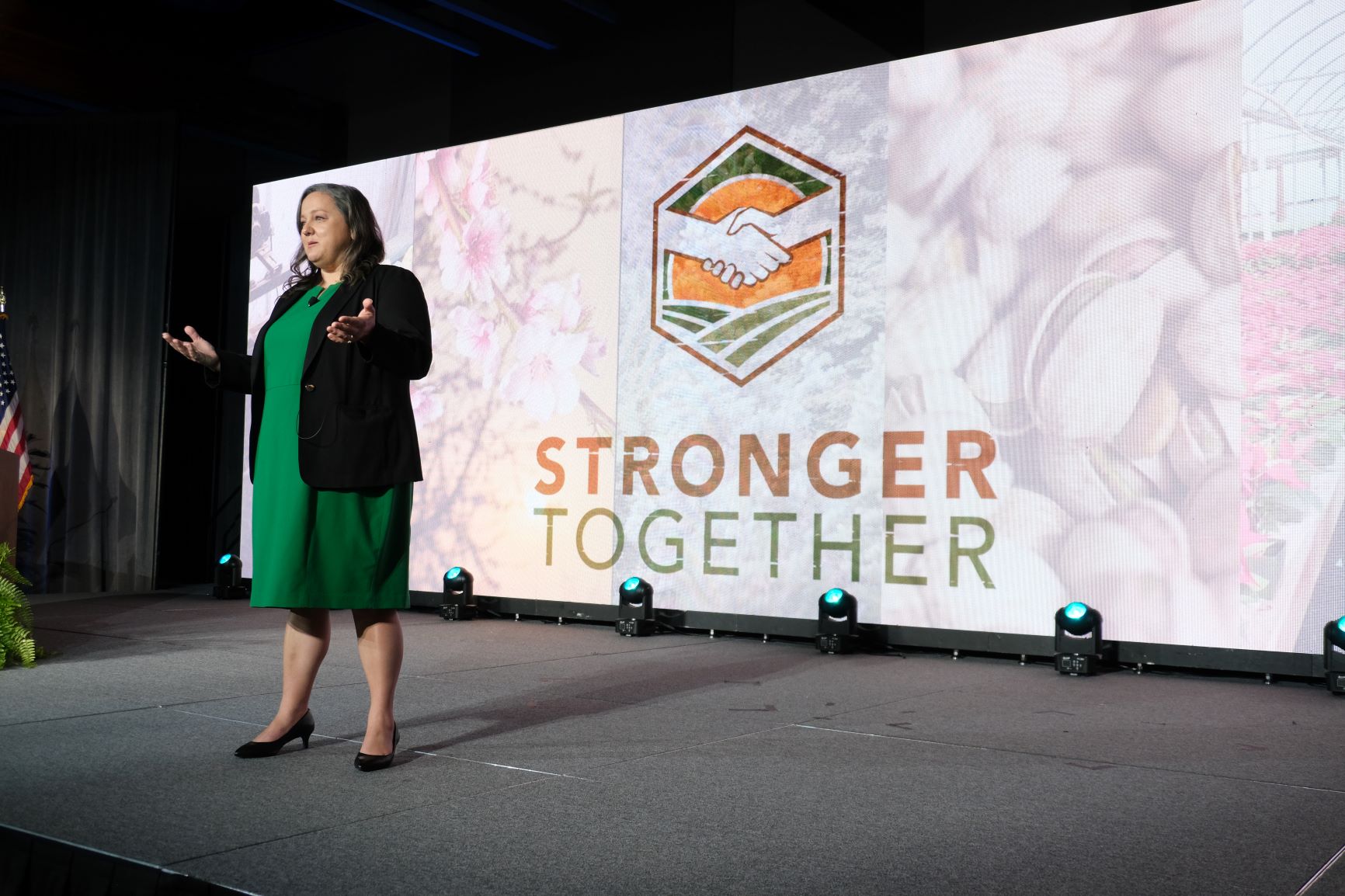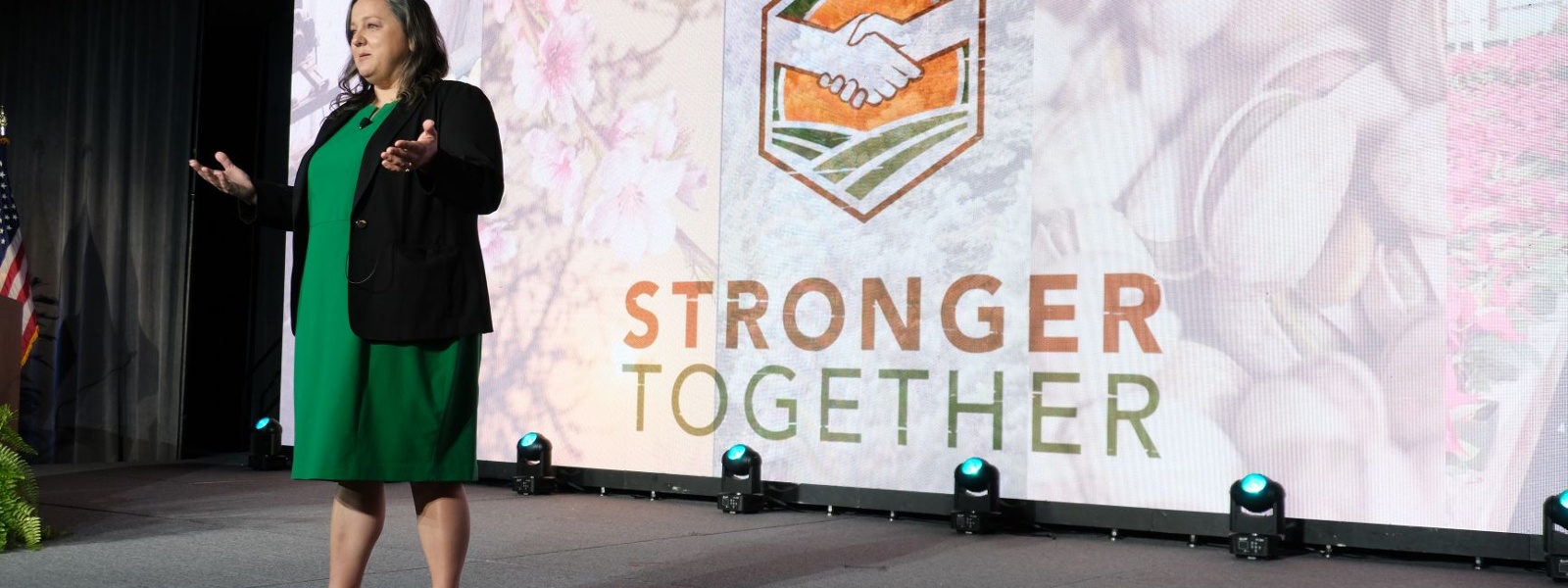Douglass honors Farm Bureau successes

California Farm Bureau President Shannon Douglass, in her first annual address as leader of the organization, speaks to members Monday during the 106th California Farm Bureau Annual Meeting in Monterey. Douglass highlighted local accomplishments and the organization’s strength in unity.
Photo/Brian Farinas

By Caleb Hampton
California Farm Bureau President Shannon Douglass celebrated the organization’s accomplishments this year in an address delivered Monday at the Farm Bureau’s 106th Annual Meeting in Monterey.
Douglass, speaking in her first annual address since being elected last year to lead the Farm Bureau, focused on local achievements and on the organization’s strength in unity.
The Farm Bureau president owns Douglass Ranch in Glenn County, where she raises beef cattle and grows walnuts, sunflowers, pumpkins, corn and forage crops.
“‘Stronger Together’ is more than a catchphrase,” Douglass said of the Farm Bureau’s theme for this year’s Annual Meeting, which brought together farmers and ranchers from across California. “We can have extensive success as a state organization, but it doesn’t matter if we don’t have strong county Farm Bureaus.”
Douglass cited examples of the Farm Bureau’s impact this year in different parts of the state, beginning with the resounding defeat of Measure J, a Sonoma County ballot measure that within three years would have banned large dairies and poultry farms in the county.
“We recognized that something like this in Sonoma County could easily be replicated” in other counties “and across the country,” Douglass said.
The Sonoma County Farm Bureau, with support from the California Farm Bureau and county Farm Bureaus, waged a more than yearlong campaign to defeat the measure.
“Not only were they successful, they were extremely successful,” Douglass said, with voters in the county rejecting Measure J by a margin of roughly 85% to 15%.
In Imperial County, the local Farm Bureau “decided this year they needed to get more involved politically,” Douglass said. The county Farm Bureau made early endorsements of candidates in certain races, especially backing incoming Assembly Member Jeff Gonzalez, R-Coachella, a retired Marine who narrowly won a district long held by Democrats.
The county Farm Bureau played an active role in determining the outcome, Douglass said, hosting ballot-curing events as election officials counted votes for nearly two weeks after election day.
“They now have a new friend in the state house,” Douglass said.
She acknowledged the efforts of leaders at the San Francisco and San Diego County Farm Bureaus to cultivate relationships with staff at the California Department of Pesticide Regulation.
Earlier this year, DPR partnered with farmworker advocacy groups to host a “Toxic Tour” of farms, raising concerns from agricultural stakeholders whose crop protection materials the department oversees.
She also thanked San Diego County Farm Bureau President Dana Groot for working to “build that bridge” between Farm Bureau and DPR.
“This work is done in every single one of your counties,” Douglass said. “There are big accomplishments, simple accomplishments, and they all make a difference.”
During her address, Douglass announced a $200,000 gift from Amador County Farm Bureau President Jim Spinetta and his wife Normita Spinetta. The gift will serve as an endowment to increase the monetary awards given to winners of the annual Young Farmers & Ranchers Open Discussion Meet. (See related story, Page 3) The event serves as a forum for YF&R members to discuss the challenges agriculture faces and potential solutions.
“The contribution will serve to endow the Young Farmers & Ranchers discussion meet program,” Douglass said. “The proceeds from this investment every year will help to fund those awards and help continue to grow (them) because Jim strongly believes that the winners of contests like these are our future leaders.
“And as we get more of them involved and encourage them to participate, our Farm Bureau is better and stronger,” she added.
Douglass announced changes to the way Farm Bureau members will determine policy stances and advocate for policy next year.
Instead of holding the organization’s regular Commodity Advisory Committee meetings in Sacramento, “these are going to be traveling Commodity Advisory Committees, held up and down the state” and available virtually so that more people can participate, Douglass said.
Farm Bureau will also shift the time of year when it convenes members at the capitol to advocate for policy during meetings with legislators.
The organization’s annual Capitol Ag Conference has recently been held in March, before most bills in the state Legislature have advanced very far. Next year, Douglass said, the visits will happen in May.
“We’ll be further along in the policy process,” she said, “and we’ll be better able to advocate on those issues.”
Douglass recognized several county Farm Bureaus that met goals of increasing their membership this year, including the Alameda, Calaveras, Humboldt, Inyo-Mono, Lake, Lassen, Marin, Monterey, Napa, Orange, San Luis Obispo, Siskiyou, Solano, Sonoma, Trinity and Tuolumne County Farm Bureaus.
The Lake County Farm Bureau, Douglass said, added more than 60 new members, increasing its membership by more than 20%.
Meanwhile, in its first year, the new San Francisco Farm Bureau enrolled more than 100 members.
“Thank you for showing us what’s possible when we put our mind to something,” Douglass said.
(Caleb Hampton is an assistant editor of Ag Alert. He may be contacted at champton@cfbf.com.)




